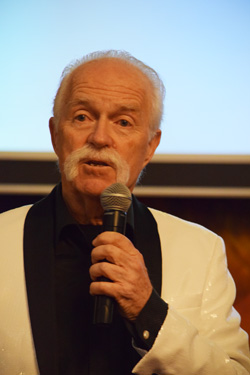By Donald H. Harrison


SAN DIEGO – In this column, I will respectfully disagree with esteemed Geology Professor Patrick L. Abbott, not about his subject matter, over which he has a sensational command, but rather about his reticence to offer public policy suggestions based upon his knowledge.
If anyone still needed convincing that climate change and global warming are likely to cause big problems for life as we know it on Mother Earth, then all they had to do was to attend Abbott’s lecture Sunday night, May 26, at a meeting sponsored by Tifereth Israel Synagogue’s Men’s Club and Sisterhood.
With maps, charts, graphs, and statistics, Abbott convincingly documented the warming of the atmosphere, the melting of the Arctic glaciers, the rising of sea levels, and the accelerating growth rate of the world’s population.
Then he declined to answer a question that was on some, if not all, the minds of the attendees.
What does he recommend that we do about it?
He responded that he considers it his role to describe what is happening, and to let others prescribe.
I later took issue with Abbott, who is a retired San Diego State University professor and a man who is interviewed on local television whenever an unusual weather or geologic event occurs. His scientific books include Natural Disasters and The Rise and Fall of San Diego: 150 Million Years of History Recorded in Sedimentary Rocks. He also travels around the world delivering lectures. Following his speech, I told him that I was both enlightened by his talk, and quite disappointed.
“Enlightened” because his slide presentation helped to make the extent of climate change and global warming very apparent. Disappointed, I confessed to him, because if the people who understand the problem are unwilling to make recommendations based upon their learning, then the debate will be dominated by people of less learning, and those who want to bend the issue to their political points of view, rather than to the facts.
Abbott shared with me that he has heard such criticism before. In fact, he said, there have been times when people actually poked fingers toward his chest while telling him how wrong he is not to share his considered recommendations.
However, he added, he believes he has a very good reason for declining to make recommendations. As soon as someone makes a recommendation, he said, that person immediately is labeled as being pro- or con- this or that political ideology.
That, in turn, can devolve into a political argument, rather than leading to a search for solutions, Abbott said.
By simply laying out the facts, he added, he can educate people about why scientists conclude that there has been significant climate change over the years. Once people face the facts, he said, they may themselves come up with recommendations about what should be done.
I can see Abbott’s point, but I nevertheless respectfully disagree.
Given his deep understanding of the issue, I think we all would benefit by learning how he believes people should respond at the individual level, and what policies he believes would be helpful at the local, state, national, and international levels.
Yes, it’s true some people might label him as belonging to one political camp or the other, and therefore reflexively disagree with his recommendations.
But so what? The recommendations will become part of the informed debate, available for people to consider and perhaps to refine. Widely discussed, they are likely to have a greater impact than his academic lectures alone.
As President Theodore Roosevelt might have argued, it’s important for knowledgeable people to get into the arena, and not just sit on the sidelines.
So, Professor Abbott, if matters are as dire as your maps, graphs, charts, and statistics indicate that they are, it’s time for you – and all of us who respect your learning – to step up.
*
Harrison is editor of San Diego Jewish World. He may be contacted via donald.harrison@sdjewishworld.com